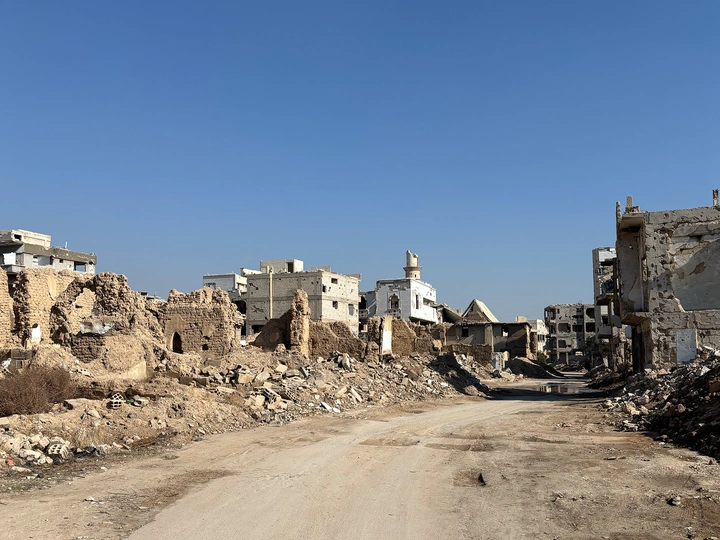"Al-‘ar·d" Think-Tank

Qusay Amer
Angham Daiyoub
Kinan Deep
Tameem Emam
Walaa Haj Ali
Mudar Obaid Dabbous
Mohammad Salloum
Al-‘ar·d is an interdisciplinary Think-Tank and collective based in Berlin. The team brings together architects, environmental researchers, urban planners, and policy analysts committed to sustainable and community-rooted reconstruction in post-conflict environments—particularly Damascus, Syria. Our work bridges academic research with real-world implementation, combining circular construction, ecological restoration, and participatory design.
Our team includes:
- Qusay Amer, architect and PhD candidate at TU Berlin, focuses on urban poor-built environments and participatory planning.
- Angham Daiyoub, PhD candidate at ICTA-UAB, researches environmental justice in conflict-affected regions.
- Mudar Obaid Dabbous, architect, graphic designer and visual storyteller, explores public space and socio-political reconstruction through design.
- Kinan Deep, earth-based material expert, at Kéré Architecture, specializes in low-tech, community-driven construction.
- Walaa Haj Ali, environmental designer, works at Transsolar in Stuttgart, where she develops climate-responsive strategies for the urban environment.
- Mohammad Salloum, geospatial analyst, investigates climate change impacts in Syria using GIS and remote sensing.
- Zakaria Al Shmaly, policy analyst and doctoral fellow at UNU-MERIT, focuses on migration, governance, and reconstruction policy.
- Tameem Emam, civil engineer and urban development practitioner with an MSc from UCL, has led housing and infrastructure projects in Syria and the UK, focusing on property rights, field engineering, and community-centered recovery.
Together, we aim to develop replicable models of resilient post-war rebuilding through low-tech solutions, local knowledge, and environmental responsibility. Our combined expertise enables us to operate across research, education, field implementation, and policy engagement.
“Al-‘ar·d” (Arabic for earth) brings together expertise in architecture, environmental design, urban planning, civil engineering, physical geography, ecology, and development economics. Its core objective is to bridge the gap between academic inquiry and the realities of on-the-ground rebuilding, producing actionable knowledge and physical outcomes that contribute to long-term resilience and environmental regeneration in the post-war reconstruction process in Jober neighbourhood, Damascus, Syria. This broad intellectual base allows the Think-Tank to approach reconstruction as a complex and interconnected process, where environmental, material, cultural, and social dimensions must be understood and engaged simultaneously. A central aim is to explore and prototype sustainable construction methodologies that integrate local knowledge, recycled materials, and bio-based alternatives in ways that are both economically feasible and environmentally responsible.
The project impact is envisioned on multiple levels. At the material scale, it seeks to demonstrate through a 1:1 architectural prototypes the potential of circular construction by reusing rubble from war-damaged sites, reducing waste and carbon footprint, the use of bio-based materials and finding affordable solutions for the people. This process will employ low-tech methods—defined here as context-sensitive, resource-efficient, and easily replicable solutions suited to fragile and resource-constrained environments. A second key outcome will be comprehensive documentation and analysis, including environmental assessments, feasibility studies, and policy-relevant insights. These outputs are intended to inform local building practices, academic discourse, and community-led reconstruction initiatives.
